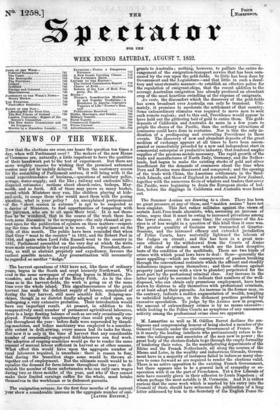NEWS OF THE WEEK.
Now that the elections are over, one hears the question ten times a day, when will Parliament meet ? The makers of the new House of Commons are, naturally, a little impatient to have the qualities of their handiwork put to the test of experiment. But there are more weighty reasons for wishing that the promised autumnal session may not be unduly delayed. When the customary season for the assembling of Parliament arrives, it will bring with it the usual superabundance of business,—questions of sanitary police, sewage,- water-supply, and the like ; railway and enclosure bills ; disputed estimates ; motions about church-rates, bishops, May- nooth, and so forth. All of these may prove so many bushes, round which Ministers may run, like children playing at hide- and-seek, to escape those who would meet them with the posing question, what is your policy ? An unexplained postponement • of the " short session in autumn" is apt to be suspected as a device of Ministers, to find opportunities of tampering with the jurymen who are to sit upon their trial. It is not there- fore to Ise wondered, that in the course of the week there has been some discussion in the newspapers—the only channel at pre- sent open for the publication of opinion on these matters—respect- ing the time when Parliament is to meet. It might meet on the 20th of this month. The public have been reminded that when Earl Grey " went to the country " in 1831, and Sir Robert Peel in 1834, and again when Lord John Russell went to the country in 1841, Parliament assembled on the very day at which the writs were made returnable by the royal proclamation. Precedent, there- fore, as well as abstract propriety and expediency, favours the earliest possible muster. Any procrastination will necessarily be regarded as another "dodge.'


























